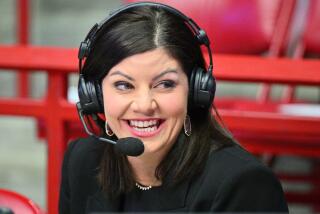Column: Referee organization working to level the field for women
One of the greatest compliments Christina Unkel received in her long career as a soccer official came the time a player addressed her as “sir.”
“It’s weird thing,” she said. “They’re like, ‘Oh, I’m so sorry.’ I’m like, ‘No, it’s great. I’m glad you forgot that I’m a girl. That’s helpful. That means you’re not focused on that.’”
Unkel has stood out most of her adult life, pursuing a double major in college, earning a law degree and learning a second language.
But on the soccer field, she’s spent much of her time trying to blend in, mainly working games in the National Women’s Soccer League and numerous age-group tournaments. Because while women can run major corporations, sit on the Supreme Court and even run for president, they still haven’t been able to find regular work as a center referee at the top level of soccer in the U.S. and Canada.
Peter Walton is determined to change that. A former English Premier League referee and now general manager of the Professional Referee Organization, which oversees the officiating for professional soccer in the U.S. and Canada, Walton is making a concerted effort to increase opportunities for female referees.
“The ultimate goal,” he said, “is to have a female officiating as the center referee in Major League Soccer.”
Some of that stems from a desire to strike a blow for gender equality. But Walton insists what he’s really trying to do is find the best referees, irrespective of gender.
“The message I’ve given — quite clearly and strongly at times — is that I’m interested in ability. I’m not interested in gender,” he said. “If the ability’s there, give them the opportunity and give them the chance to shine.
“It’s beginning to bear fruit. Over the next two to three years you’ll see more and more female officials actively engaged in professional refereeing. That’s the way it should be.”
And that’s the way it once was, with Sandra Hunt, Nancy Lay and Kari Seitz all working as center referees for a handful of games in the nascent days of MLS nearly 20 years ago. Hunt did her last match in 2000, though. And while both the NFL and NBA have used female officials since then, no woman has run a top-tier men’s soccer game in the U.S. or Canada in 17 years.
MLS does has two female assistant referees — Felisha Mariscal, who began working MLS games in 2014, and Kathryn Nesbitt, who made her MLS debut in 2015. But their main responsibilities involve offside and boundary calls and monitoring bench behavior while center referees control the flow of the match by managing the players, determining fouls and issuing red and yellow cards.
“The importance of having a female official is just the importance of recognizing, like anything in life, there should be diverse individuals refereeing these matches,” said Unkel, whose husband Ted is an MLS referee.
“As a referee you are the captain of that ship,” added Unkel, a Sarasota, Fla., attorney who has sat out most of the past two years after giving birth. “You’re responsible for setting the tone. If you’re the head referee, you’re leading it.”
If Walton is trying to reopen a path to the center in MLS, he’s also trying to catch up to some of Europe’s top leagues. Last month the German Bundesliga added Bibiana Steinhaus, a well-respected official with a deep international resume, to its list of referees for 2017-18, while Sian Massey-Ellis began working as an assistant referee in the Premier League in 2010.
At the beginning of her career, Massey-Ellis was the target of sexist criticism — including comments that cost two Sky Sports TV commentators their jobs. But Nesbitt said the only reaction she’s noticed has been surprise.
“In working the men’s game I have seen some players and coaches be startled, at first, by a woman on their match,” said Nesbitt, who has done games in the NWSL as well as in the USL and NASL, the second-tier men’s leagues in the U.S. and Canada. “But they are generally accepting of it. The overwhelming reception has been positive and I think a lot of that comes from female officials showing well in the men’s game.”
Nesbitt, a postdoctoral research fellow at the University of Michigan, has a doctorate in chemistry but mental fitness is just one requirement for a top-level soccer referee. Physical fitness is also important and female candidates have to meet the same standards as men on a series of challenging tests that include repeated sprints over distances from 40 to 150 meters.
“Women can and do meet these standards,” Nesbitt said.
So, Walton concluded, if women have the ability, the desire and the physical and mental capabilities to be center referees, the only thing missing is the opportunity. He’s determined to provide that, recruiting female officials at the grassroots levels, giving them experience and exposure with high-profile assignments such as the MLS combine, then helping mentor their development.
He’s been rewarded with measurable progress. Before Walton joined Professional Referee Organization in 2012, female officials got between 5% and 10% of the center-referee assignments in the USL and NASL. Now the percentage of female referees eligible to work professional games ranges as high as 20%.
Yet despite his desire for inclusion, Walton insists this is not an affirmative-action program. When he receives information on an official or when the referee organization is choosing referees to work particular games, he insists the paperwork include nothing more than the officials’ surname.
“Our goal is to make sure that we look at officials and not the gender aspect,” he said. “And if that person in front of me, in front of my developmental people, is good enough, then they’ll get the opportunity.”
Twitter: kbaxter11







